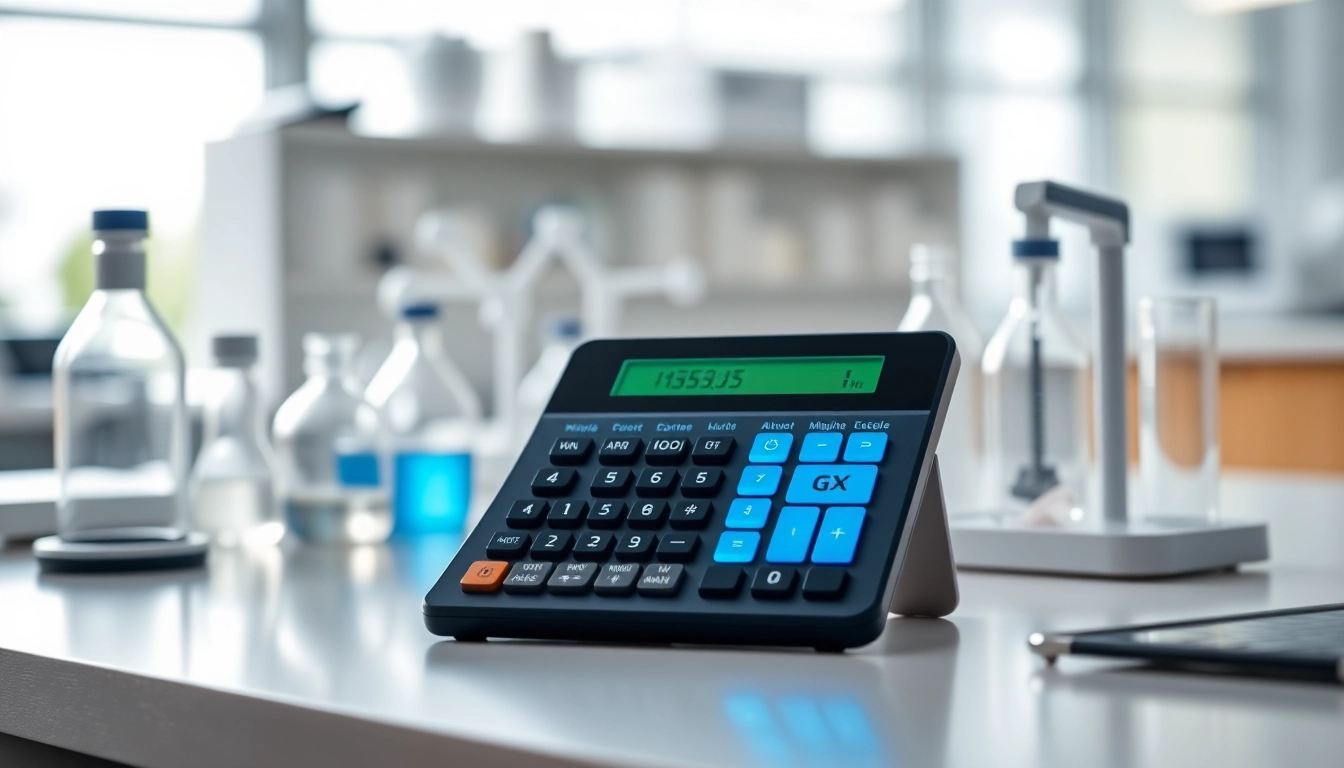Understanding the DNA Molecular Weight Calculator
What is the DNA Molecular Weight Calculator?
The DNA Molecular Weight Calculator is an essential tool for researchers in the field of genetics and molecular biology. This calculator takes a DNA sequence as input and computes its molecular weight based on the nucleotide composition. The molecular weight is critical for various applications, including estimating the amount of DNA in a sample, preparing solutions for experiments, and understanding the biophysical properties of nucleic acids.
Importance of Molecular Weight in Biochemical Applications
Molecular weight plays a vital role in numerous biochemical applications. For instance, it is crucial for:
- Quantifying DNA: Molecular weight helps convert concentrations (like μg/ml) to mole-based measurements, facilitating dilution and preparation of DNA samples for experiments.
- Calculating Molarity: Knowing the molecular weight allows researchers to compute the molarity of DNA solutions, which is essential for creating reactions with precise stoichiometry.
- Determining Copy Number: Researchers can determine the number of copies of a specific DNA sequence in a sample by calculating the molecular weight and using it alongside the total amount of DNA present.
Basic Guidelines for Using the Calculator
When using a DNA Molecular Weight Calculator, there are a few guidelines to keep in mind:
- Input Format: Ensure that the DNA sequence is entered correctly. Many tools accept sequences in either plain text or FASTA format.
- Sequence Length: The length of the sequence significantly impacts the molecular weight; longer sequences generally have higher molecular weights.
- Base Composition: Be aware that the molecular weight calculation is based on the percentage composition of the four nucleotides (adenine, cytosine, guanine, thymine).
How to Use the DNA Molecular Weight Calculator
Step-by-Step Process for Inputting DNA Sequences
Using the DNA Molecular Weight Calculator is straightforward. Here’s a step-by-step guide:
- Access the Calculator: Navigate to a reliable DNA Molecular Weight Calculator, such as the DNA Molecular Weight Calculator.
- Enter the Sequence: Input your DNA sequence directly into the provided text box. Ensure there are no spaces or irrelevant characters included.
- Choose Format: If applicable, specify the format of the input (plain text or FASTA).
- Calculate: Click the “Calculate” button to generate the molecular weight of your input sequence.
- Review Results: Examine the results provided, which will typically include the molecular weight in Daltons (g/mol) and might also indicate other useful measurements.
Common Mistakes to Avoid When Calculating
To ensure accurate results when using the DNA Molecular Weight Calculator, avoid these common mistakes:
- Incorrect Sequence Input: Typing errors in the DNA sequence can lead to erroneous weights. Double-check the sequence.
- Ignoring Nucleotide Contributions: Skipping the understanding of how each nucleotide contributes to the total weight can lead to confusion.
- Misunderstanding Output Units: Make sure to understand how the output values correspond to your experimental needs, whether they are in micrograms, nanograms, or moles.
Interpreting the Results Accurately
Interpreting the results from the DNA Molecular Weight Calculator is essential for accurate application in experiments. Key points to keep in mind include:
- Molecular Weight Value: Indicates the total mass of the DNA molecule, which can guide further experimental design.
- Relation to Concentration: Understanding the relationship between molecular weight and concentration helps inform how much of the DNA is needed in various protocols.
- Effect of Modifications: Any chemical modifications to the DNA sequence will alter its molecular weight, so adjustments should be calculated to reflect these changes.
Applications of DNA Molecular Weight Calculations
Role in Genetic Research and Analysis
In genetic research, accurate molecular weight calculations facilitate various analyses, such as:
- Gene Cloning: Understanding the molecular weight assists in determining the amount of vector DNA needed for cloning experiments.
- Sanger Sequencing: The molecular weight can play a role in preparing DNA fragments for cloning and sequencing by influencing fragment size and compatibility.
- Mutation Analysis: Researchers can infer the impact of mutations on molecular weight, providing insights into their significance.
Influence on PCR and Cloning Techniques
Polymerase Chain Reaction (PCR) and cloning are techniques heavily reliant on accurate DNA quantification and molecular weights:
- Optimizing PCR Conditions: Knowing the molecular weight can help in determining the optimal concentrations of primers and template DNA.
- Cloning Efficiency: In cloning, precise calculations ensure that the insert DNA can effectively ligate with the vector, impacting yield.
- Assessing Fragment Size: Understanding how fragment size affects molecular weight is vital for maintaining the integrity of cloning constructs.
Comparative Analysis with Other Calculators
When evaluating various DNA molecular weight calculators, consider factors like:
- Accuracy: Different calculators may use varied methodologies; compare outputs against expected values for reliability.
- User-Friendliness: The interface and ease of use can greatly affect how quickly users can obtain the needed results.
- Speed: Some tools may provide instant results, while others might require additional processing time.
Enhancing Efficiency in Research with the DNA Molecular Weight Calculator
Integrating the Calculator into Your Workflow
To maximize efficiency, integrating the DNA Molecular Weight Calculator into your research workflow can be beneficial. Here are some tips:
- Standard Operating Procedures: Include molecular weight calculations in SOPs for experiments involving DNA.
- Data Recording: Maintain detailed records of calculations and their outputs to enable faster replication of results.
- Workflow Automation: Consider tools that export data for analysis or integrate with laboratory information management systems (LIMS).
Tips for Optimizing Usage for Accurate Measurements
To get the most out of your calculations, follow these strategies:
- Check for Updates: Ensure you are using the latest version of the calculator, as updates can improve accuracy.
- Calibration: Regularly calibrate your inputs against known standards to ensure the calculator outputs accurate measurements.
- Validation: Cross-validate your results with alternative methods or tools to confirm your findings.
Maximizing Data Collection and Interpretation
Beyond calculation, data collection and interpretation are critical for enhancing research outcomes:
- Database Integration: Store molecular weight data alongside other experimental parameters to facilitate comprehensive analyses.
- Statistical Analysis: Leverage statistical tools to better understand the implications of the molecular weight on your research questions.
- Visualization Tools: Use software that can visualize DNA sequences, molecular weights, and their relationships for clearer insights.
Future of DNA Molecular Weight Calculators
Emerging Technologies in Molecular Weight Calculation
The future of DNA molecular weight calculators is likely to be shaped by advances in technology. Innovations may include:
- Artificial Intelligence: AI could provide more personalized calculations by learning from existing datasets and experiments.
- Mobile Applications: The availability of on-the-go solutions may enhance accessibility for field research.
- Automated Laboratory Systems: Integration of calculators with robotic systems to streamline sample processing and analysis.
Predicted Trends in DNA Analysis Tools
As molecular biology evolves, several trends may emerge within DNA analysis tools:
- Cross-compatibility: Tools that can seamlessly exchange data with one another will increase research efficiency.
- User-Centric Interfaces: Enhanced focus on user experience will lead to tools that cater specifically to the needs of varied users—from beginners to advanced researchers.
- Integrated Databases: Future calculators might offer links to comprehensive databases, providing direct access to existing molecular weight data for comparison and validation.
Continued Importance of Accurate Molecular Weight Measurement
The precision in molecular weight measurement remains critical as research demands greater accuracy. This reliability contributes to:
- Reproducibility: Accurate measurements lead to consistent results across laboratory settings, essential for scientific progress.
- Experimental Success: Correctly calculated molecular weights directly influence experimentation, particularly in complex procedures like gene synthesis and genome editing.
- Data Integrity: As the focus shifts toward data-driven research, the accuracy of molecular weight calculation will become even more paramount.



